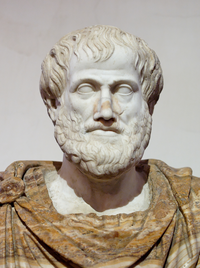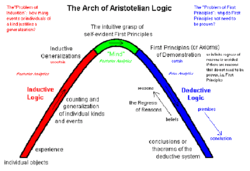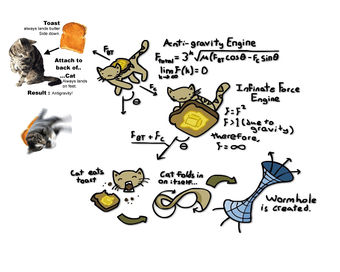Aristotle
 This is the handsome rugged face of a | |
| Full name | "Mr." Aristotle |
|---|---|
| Born | 384 B.C. Stageira, Greece |
| Died | 322 B.C. Euboea |
| Era | A long long time ago, |
| Region | In a polis far far away... |
| School | Hard Knocks Greek Academy |
| Main interests | Stuff |
| Notable ideas | Other stuff |
| Influenced by | People who knew some different stuff |
| Influenced | Other people who owed him money |
| Favorite snack | Grapefruit |
“Character may almost be called the most effective means of persuasion. Almost.”
– Aristotle on why he was so persuasive.
Aristotle (Greek: Ἀριστοτέλης, Aristotélēs) (384 BC – 322 BC) was a Greek philosopher, student of Plato, teacher of Alexander the Great, and all around philanderer[1]. His teachings covered many topics, including politics, physics, sex, music, ethics, sex, and of course, Greek daytime stage drama. Aristotle, Plato, and Socrates were the most important philosophers of Western society. Without them, the Earth as we know it would have been lost in chaos and despair. Aristotle's works influenced many thinkers [2] throughout the following centuries, most prominently his views on science shaped medieval scholarship until Newton came around and shredded everyone's collective knowledge into a thousand tiny pieces. Paradoxically, the Catholic Church borrowed heavily from his use of logic as well in their own scholastic traditions (see Spanish Inquisition for more information). He is widly regarded as the most correct scientist and philosopher ever to walk the earth.
Life
Aristotle was born to an autonomous commune roughly during the spring of 384 B.C. Due to the free-spirited nature of their collective and the liberal views on sex that the members had, no birth certificate or father ever surfaced for Aristotle. After angering the collective for puking on the ringleader's shoes, Aristotle was left on the side of the road to fend for himself at the ripe age of 14 months. Luckily for the infant, a man by the name of Nichomachus happened to walk by hours later. Being incredibly rich and important, it was only natural for him to pick the child up and adopt him as his own.
As a young man Aristotle astounded the members of the aristocracy with his incredible wisdom. He would often be able to accurately predict the outcomes of that day's lottery numbers. This made him incredibly popular with the Greek nobility. One of these Greek aristocrats was the philosopher Plato. Being a very shrewd but intelligent business proprietor, Plato offered to let Aristotle study at his school, the creatively-named Plato Academy.[3] At the age of 18, Aristotle left for Athens and joined Plato where they reasoned together often and explored life's mysteries together.
After graduating, Aristotle toured the island of Lesbos with an acquaintance, Xenophobocrates. The two collected specimens of the various regional flora and fauna. The list of species discovered by the two runs for pages and pages, but these are the highlights: the Speckled Frog of Lesbos, the Lesbian Whale, Homosexual Women, and the California Condor.
Aristotle returned to mainland Greece the following year and was contracted by Phillip II of Macedon to head the exclusive Royal Macedonian Public School. It was at this academy that Aristotle taught many famous thinkers, conquerors, and kings of the 4th century B.C. This long and illustrious list includes: Alexander the Great, Alexander the Average, Alexander the OK, Alexander the Typical, Dave, Alexander the Overweight, and Ptolemy. Only two of these guys are really sort of noteworthy in modern times, but Alexander the OK was in fact the most popular kid in class. Aristotle mentored these young men in such topics as philosophy, politics, cooking, cleaning, rummy, and common gardening techniques. Of all of these lessons, Alexander the Great was quoted as saying that, "the most useful of information to the application of modern [sic] warfare is the orderly arrangement and care of herbs, of which I was taught by Master Aristotle. To him I am ever grateful."
Aristotle opened his own personal academy in Athens in 335 B.C. now known as the Lyceum. It was during his time in Athens that Aristotle wrote his principal works, the most famous of which is entitled Politics. Other famous works of Aristotle include Poetics, Physics, Metaphysics, and Ethics. Aristotle was well-known by his contemporaries for his creative titles.
Logic
Logic is the employment of anti-stupidity. More specifically, it is the process in which one makes non-idiotic decisions or conclusions about the world. Aristotle is regarded as the principle author of the theory of logic. Aristotle's understanding of logic was the principle process of discovery and understanding until late-19th century mathematics circle-jerks produced modern notional theories. It was indeed to poke fun at these people that the writer and photographer Lewis Carroll wrote Alice in Sunderland.
History
Before Aristotle, the earth was devoid of logic and reason. Chaos existed everywhere and there was no order. People were incapable of making rational decisions and killed anything they saw that was unfamiliar to them. Then, at the age of 47, Aristotle ascended Mount Olympus and received instruction from mighty Zeus himself. "Go forth, and bring light to the nations, my son," Zeus said. "But Lord, how am I to do this?" asked Aristotle. "Bitch! Don't back talk me!" thundered the Mighty One. Thus Aristotle began instructing Greeks everywhere on the subject of logic.
Sexual Logic
Aristotle is often credited and appreciated for his teachings on the logic of sex. He often regarded the act as one of the most logical things human beings could do. His most famous quote on the subject is probably from his address to the students of Delphi University in 334 BC: "Hurngh! OOOPH! Oh, Zeus, I'm... I'M... AAAAAAAHHHHHH!" Customarily, Aristotle would give weekly tutoring sessions to lucky pupils, both male and female, on his sexual logic. Whilst engaged in the act itself, Aristotle would often pose questions and give thoughts to the lucky student.
Aristotle's sexual logic is often summed up in what is today called "Aristotle's Law of Libido." This theorem accounts for just how logical sex really is. Many people point out that libido has nothing to do with logic and reason. Historians believe Aristotle chose this particular concept for the name of his law as a crude way to brag about his prowess in bed. The theorem has four parts that explain the logic:

- Sex feels great.
- Sex is a commodity to be bought, sold, given as charity, or as a gift. Therefore, sex = currency.
- Sex is fun.
- Sex feels great.
Aristotle's Scientific Method
Some claim that the Muslims were the ones who are responsible for laying the groundwork for the modern ways of science. This is utterly preposterous, as Aristotle developed his own scientific method prior to the creation of Islam. While the Arabs were still tent-dwelling polytheists instead of house-dwelling polytheists like the Greeks, Aristotle used his magnificent brain to conclude that science was formulaic and related to observation instead of being associated with the sacrifice of virgins and the inhaling of herbs. After reaching these conclusions he developed his step by step process for the creation of science:
- Step 1: Be puzzled by something. The world is confusing; chances are there are things that you don't understand.
- Step 2: Watch that something. Aristotle first decided to watch his cat and see what he could learn.
- Step 3: Record observations of that something. Aristotle noted that his cat tended to be lazy and do nothing.
- Step 4: Make a logical conclusion about that something based on said observations of that something. Thus Aristotle scientifically proved that cats are lazy assholes.
- Step 5: Gloat to others of your discovery. Aristotle began to parade the streets of Athens proclaiming that cats were lazy assholes. The Greeks were jealous indeed.
From here many in antiquity began to make their own scientific discoveries. Mostly, though, Aristotle used his theory to legitimize his crazy ideas about the physical world, rather than produce any actual new knowledge. When people would point out that small rocks were not capable of being buoyant, Aristotle would simply retort that he had proved it through his method. When asked to elaborate, Aristotle would plug his ears with his index fingers and loudly shout that he had seen it himself many times. People at that point simply gave up trying to argue with him.
Physics and Metaphysics
Most of Aristotle's contributions to science involved his preliminary observations of the physical world. In fact, Aristotle's crazy theory about how light is a physical object turned out to not be crazy, but actually true. Aristotle reached this conclusion, however, as a result of bad science and luck and not through intuition (although Aristotle would probably be the first to argue against that). You see, Aristotle was walking into the city square of Athens from the west one morning. When he rounded the corner of πολλά γατάκια Avenue, he was met by the blinding morning light. He then crashed into a parked cart and stumbled around in a daze. After waking up some hours later, Aristotle concluded that he had been hit with an extra strong dose of sunshine that morning.
Aristotle mistakenly 'fell over' a number of scientific truths in this way[4] . For example, he determined that the earth is round when he spilled a bag of marbles down a hill. He discovered atoms while eating an apple. Aristotle is, however, most famous for his discovery of Bernoulli's Principle almost 1,500 years before Bernoulli was born. Aristotle was fishing on the Αλφειός River one weekend in 317 BC. He observed that the globs of spit he was strategically placing in the river were speeding up when they went through smaller channels of passage, like between rocks. While Aristotle was wrong when he concluded that it was the spit that was making the water faster, his observations were nonetheless correct. When Bernoulli discovered his own principle in the 1700s, he was actually trying to find an alternative form of acceleration for waterborne vehicles, the main method of the time, of course, was to spit on the bow of the vessel.
Aristotle's Cat
As you've probably guessed by now, Aristotle was very fond of his cat[5]. He spent a lot of time observing it and making absurd scientific conclusions about it. It is no accident then that most of Aristotle's observations and theories about the natural world were based on or revolved around cats. Of all the horrifying "discoveries" Aristotle gave us about felines, there was one useful thought experiment he developed that is still relevant to philosophy today.
Aristotle's Cat is essentially a thought experiment that attempts to understand two fundamental physical truths about the universe, and what would happen in the event that both truths should collide with one another. The first truth of Physics that Aristotle observed is that toast always lands butter-side down. The second is that cats always land on their feet. Aristotle contemplated this one day when he had set out to get a snack. Having prepared a piece of toast (since there were no grapefruit to be found anywhere nearby), Aristotle proceeded to butter it. Just as he finished, his cat, Muffin, leaped from a high perch and startled him. The philosopher was astounded when Muffin landed on its feet after performing an in-air 180 degree turn and that the toast did the same to land butter-side down. Aristotle contemplated this dichotomy and secluded himself in his study, deep in thought. He then formulated his now famous Cat.
The thought experiment prompts one to contemplate the nature of these two phenomenon. The first component of the exercise is the assumption that if you attach a piece of buttered toast to the back of a cat and then throw it up in the air, it will create an anti-gravity device. Since the buttered toast would want to land butter-side down, and the cat's legs would be suspended in air and thus flip the cat to ensure it lands on its feet, the combined effect is a weightless, spinning, cat/toast machine. After this assumption has been accepted, the thinker then ponders the nature of such a device and its implications for humanity. Aristotle's contemporaries barely understood gravity, let alone the complex nature of defying it, so the most sophisticated answer to the experiment usually entailed detaching the toast and eating it, and then taking the cat home to eat at a latter date.
In modern times, however, the exercise proves quite complex given our vast understanding of the universe. A detailed diagram of how complex the question has become is found to the right. Mathematics has been able to prove that if in mid-hover the cat eats the toast, the cat will then collapse on itself, creating a singularity that in fact may be the key to time travel. Many attempts to create such an event, though, have resulted in many face-down pieces of buttered toast and many dead cats who were dropped from great heights. There has never been a successful demonstration of Aristotle's Cat, so many have concluded that Aristotle probably meant for his Cat to be a device for getting people to think about the complex nature of physics. Some say that we have yet to perfect a pure-enough butter to use. Still others think that Aristotle may have just been nuts.
Legacy
Death and Aftermath
Aristotle died in 322 B.C. as a destitute man. He had blown all of his money in the Euboea Casino and was forced to hand over all of his worldly possessions to the owners of the establishment. Aristotle even had to give up his beloved cat, Muffin. Alone and cold on the streets of Euboea, Aristotle was assaulted by local teenagers who had identified him as the student of Plato, who was in turn the student of Socrates, who had in fact been executed for corrupting the youth of Athens. Most teens in Greece were taught to hate and fear Socrates from the moment they entered teendom. Parents would often tell these Greek Youth that if they did not eat their vegetables, Socrates would come in the night and corrupt them in their sleep. Naturally, the teens in question were weary of the student of the student of Socrates. The long and short of it is that Aristotle was beaten to death for crimes Socrates had not committed by crazy teenage Greeks.
Aristotle's death sent shockwaves throughout Greece. Most were displeased that the crazy old man would no longer be around to entertain them, others were extremely glad that he was gone since he was often a drain on the local economy.[6] Mostly though, people were upset that he would not be around to pay off his sizable debts. At the time of his death, it was estimated that Aristotle owed money to a fifth of the entire male Greek population. It comes as no surprise then that about a fifth of the Greek male population attended his funeral and harassed Aristotle's relatives for gold coin.
Aristotle is infinitely more popular today than he ever was in ancient Greece. The Catholic Church uses his models of logic to simultaneously show how one should logically approach a problem or idea and also how one should not live their life if they want to go to heaven. Aristotle is also very popular with old ladies who own cats as they can identify with him the most. Aristotle's teachings, however, have proven to be extremely important to Western[7] philosophy, both modern and ancient. Without Aristotle, another one of Plato's students would have taken up the role as his mentee and this article would have been about that individual instead. But that, as Aristotle would have said, would have been a very academic question indeed!
Trivia
Aristotle was terrified of snails, because he thought they were rock-dwelling Uterus larvae, so he never touched them. This made him believe they were dry
FootNotes
- ↑ Philandering was the Eighth or the unspoken Liberal art.
- ↑ In the loosest definition of the word.
- ↑ A direct translation of Plato's name into English would render it 'Fat Guts' or 'Lard Arse'. Plato was the nickname for the very rotund Aristocles. Just as well he stuck to being called Plato for future scholars.
- ↑ Unlike most Greeks, Aristotle didn't mix his wine with water so perhaps this is an example of alcoholic Aristotelian happenstance.
- ↑ Aristotle's first animal choice - a hamster - got stuck in the eternal spinning wheel of circular logic. The luckless rodent is still there, metaphorically speaking.
- ↑ Everyone wanted to be a philosopher, to use their brain to think and their body to experiment with other students. No one wanted to work anymore
- ↑ Please note, we are not talking about Country & Western music here or Dolly Parton





